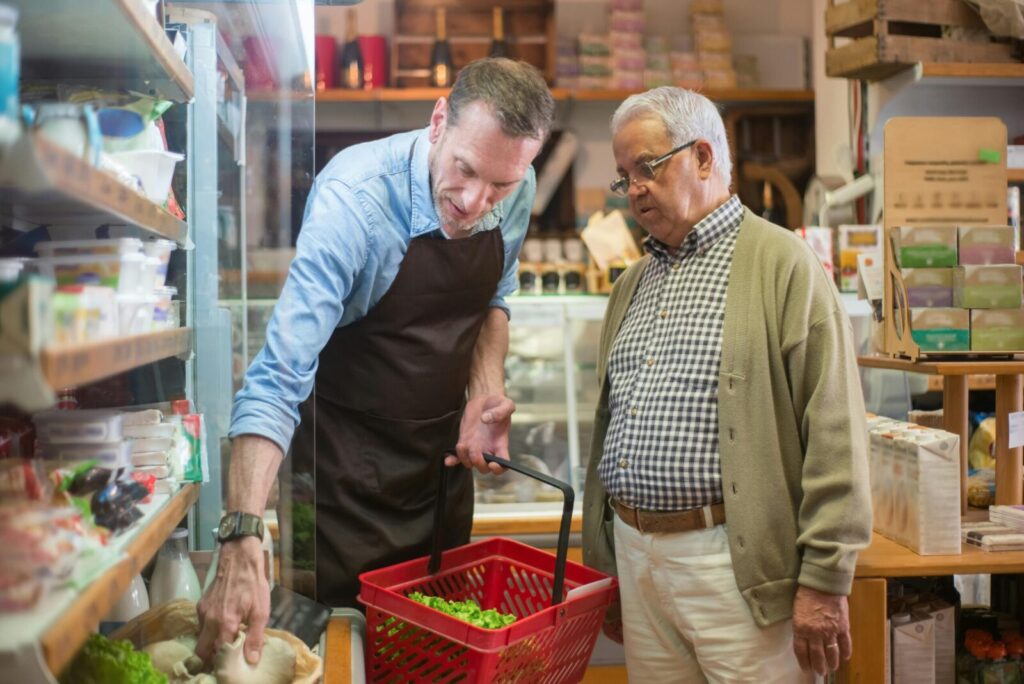Aging adults living alone often face unique challenges when it comes to grocery shopping. Limited mobility, dietary restrictions, and managing a budget can make trips to the store feel overwhelming. Ensuring access to fresh, nutritious food while maintaining independence requires planning, organization, and a few practical strategies. Shopping safely and efficiently can help reduce stress, prevent food waste, and support overall well-being. Adopting thoughtful habits can also help aging adults make healthier food choices, manage finances, and save time. With careful planning, grocery shopping does not have to be a difficult or tiring task. From planning meals to prioritizing safety, there are numerous ways to make grocery shopping manageable and even enjoyable. The following nine tips provide guidance to help aging adults living alone shop more confidently, stay organized, and maintain a healthy lifestyle without unnecessary stress or difficulty.
1. Plan Your Meals in Advance

Planning meals ahead of time helps prevent impulse purchases and ensures a balanced diet. Creating a weekly menu allows you to make a precise shopping list and avoid buying items that may go unused. Consider meals that are easy to prepare and provide essential nutrients. Planning also helps manage portion sizes and reduces food waste. By organizing meals in advance, shopping trips become quicker and less stressful. It also allows you to ensure a variety of foods are included in your diet. Taking time to plan promotes healthier eating habits and supports overall well-being while simplifying the grocery shopping process for aging adults living alone.
2. Make a Detailed Shopping List

A detailed shopping list keeps you focused and reduces time spent wandering the store. Group items by category, such as produce, dairy, and pantry staples, for easier navigation. Check your pantry and refrigerator before writing the list to avoid duplicate purchases. Include quantities to manage portion control and budget effectively. Using a checklist app or a paper list can be helpful. A clear shopping list ensures you buy everything needed for planned meals while preventing unnecessary items. This method saves time, reduces stress, and allows aging adults to shop efficiently and confidently without feeling overwhelmed or rushed during each trip.
3. Shop During Off-Peak Hours

Shopping during off-peak hours helps reduce exposure to crowds and long checkout lines, making the experience less stressful. Early mornings or late evenings are often quieter and easier to navigate, especially for those with mobility concerns. Less crowded stores provide more space for careful selection of fresh produce and essential items. Off-peak hours also reduce fatigue and minimize the risk of accidents. Using this time to shop allows aging adults to move at a comfortable pace while focusing on quality and safety. Planning trips during quieter times makes grocery shopping a calmer, more manageable, and enjoyable activity.
4. Choose Nutrient-Dense Foods

Prioritizing nutrient-dense foods supports overall health, energy, and immunity. Fresh fruits, vegetables, whole grains, lean proteins, and low-fat dairy provide essential vitamins and minerals. Avoid highly processed items that are high in sugar, sodium, or unhealthy fats. Reading nutrition labels helps identify healthier options. Including a variety of colorful foods ensures a balanced intake of nutrients and promotes better long-term health. Selecting foods that are nutritious and easy to prepare encourages independence and simplifies meal preparation. Making conscious choices about nutrient-rich foods helps aging adults maintain vitality, supports overall wellness, and reduces the likelihood of diet-related health issues.
5. Consider Online Grocery Options

Online grocery shopping offers convenience and reduces physical strain. Many stores provide delivery or curbside pickup, allowing you to avoid carrying heavy items. Online shopping also gives time to compare prices and check availability before purchase. It is especially helpful for those with limited mobility or who live alone. Make sure to check expiration dates and delivery schedules to ensure freshness. Combining online and in-store shopping provides flexibility, saves time, and guarantees access to healthy food without frequent trips. Using online grocery services can simplify life and make shopping safer, more efficient, and less tiring for aging adults.
6. Use a Basket Instead of a Cart When Possible

Using a basket instead of a full cart makes shopping safer and easier for some adults. Carrying a basket reduces the strain of maneuvering a large cart and encourages mindful purchases. It also helps prevent buying unnecessary items and keeps shopping trips shorter. For larger loads, consider using a lightweight foldable cart with wheels for support. This approach promotes better balance and reduces the risk of slips or fatigue. Shopping with a basket encourages focus on essential items while maintaining mobility and safety. It supports independence while making the grocery experience more manageable and less physically demanding.
7. Check Expiration Dates Carefully

Checking expiration dates prevents food waste and ensures safety. Pay attention to both perishable and non-perishable items before purchase. Rotate older items to the front of the refrigerator or pantry to use them first. Avoid products with short shelf lives unless they will be consumed quickly. Reading labels also helps with managing dietary restrictions or preferences. This simple habit promotes safer food consumption and reduces unnecessary spending. By paying close attention to expiration dates, aging adults living alone can maintain a healthier diet, manage their groceries efficiently, and avoid the stress of handling spoiled or unsafe foods during daily life.
8. Take Advantage of Store Loyalty Programs

Store loyalty programs provide discounts, special offers, and personalized promotions. Signing up for these programs helps aging adults save money on everyday purchases. Many programs offer digital coupons, notifications, and points that can be redeemed for future savings. Staying informed about store promotions allows for strategic shopping and budget management. Using loyalty points for essential items can reduce financial strain. This approach also encourages planning and thoughtful purchases rather than impulsive buying. By participating in loyalty programs, aging adults can enjoy savings while maintaining a well-stocked pantry and continue shopping efficiently without feeling financial pressure or missing important deals.
9. Prioritize Safety and Comfort

Prioritizing safety and comfort ensures that grocery shopping is manageable and stress-free. Wear comfortable shoes, dress for the weather, and carry water to stay hydrated. Use mobility aids if needed and avoid lifting heavy items alone. Be aware of store layouts to prevent slips or accidents, and ask for assistance when necessary. Shopping with a friend or family member provides extra support. Taking breaks as needed prevents fatigue and helps maintain energy levels. Focusing on safety allows aging adults to shop independently, confidently, and comfortably while enjoying a positive grocery experience without unnecessary risks.
Comments